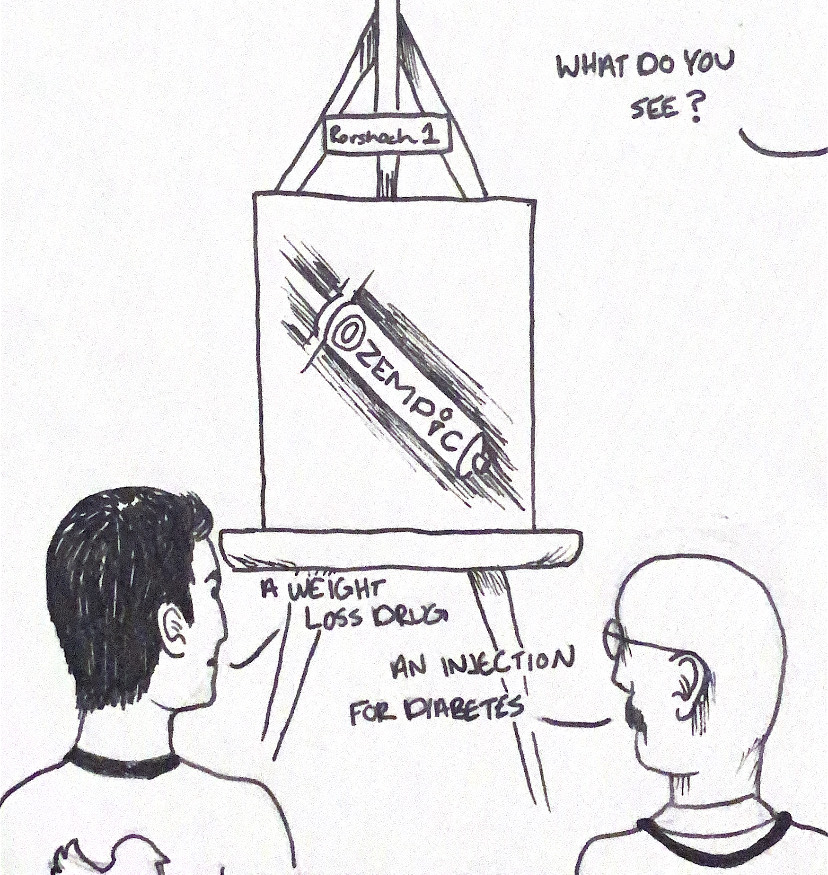Ozempic: Popular for all the wrong reasons
The internet’s hyper-focus on the drug’s weight loss side effect is just the latest manifestation of society’s toxic standards
Ozempic. I let the word stand alone in the search bar to see what information would surface. After the result for Ozempic.com, Google presented me with a series of sponsored links. One promised “safe weight loss with Ozempic,” the next boasted that customers who buy Ozempic from them (for only 036;99!) typically lose over 53 pounds. Farther down, six headlines deemed “top news stories” appear, five of which feature celebrity gossip about the drug and testimonials from people using it to lose weight.
The sixth headline, from CBS News, concerned me most: “People are using life-saving diabetes drug Ozempic to lose weight. Now it’s in short supply.” Somehow, the most prominent effect associated with Ozempic in this search query has been weight loss, but the real news here is that this drug is actually meant to treat diabetes, and it’s running low. Welcome to the internet.
It is important to note that, while Ozempic is newly popular, it is by no means new. Ozempic is the brand name for the drug semaglutide, which has been approved by the Food and Drug Administration (FDA) to treat Type 2 diabetes since 2017. Many people have taken it out of medical necessity for years. Administered via injection, it lowers the body’s blood sugar levels and increases insulin sensitivity, both of which are incredibly important for treating Type 2 diabetes. But that’s not why many have heard of it.
Social media, news outlets and whoever else we can point to as representative of the flawed values of society have fixated on a side effect of Ozempic that has now become its hallmark: weight loss. Semaglutide works in the brain as well as the body; it suppresses the appetite by dispatching signals that make the stomach feel full sooner than it would naturally, causing people to take this drug to eat less. It also causes food to leave the stomach more slowly, keeping hunger at bay for longer. In fewer words, it’s everything diet culture and show business could dream of, and then some.
Unsurprisingly, people began to take Ozempic for the sole purpose of losing weight. Both celebrities and the non-famous have found ways to obtain prescriptions for the drug “off-label,” i.e., for purposes other than those for which it was originally approved. Some began sharing their “Ozempic weight-loss journeys” on Twitter, Instagram and TikTok, while others criticized those who did so. On these social media platforms, speculations about the drug ensued, like which celebrities were taking Ozempic, how much weight it makes you lose and how fast you lose it, establishing its identity as this new “Hollywood wonder drug.” Now, there is a shortage of Ozempic, and many people taking it to treat Type 2 diabetes haven’t been able to get their prescriptions filled for months on end.
The current shortage of Ozempic is not the result of people’s irresponsible behavior in the past few months. Rather, I see it as the latest symptom of the long-term disease which is body dissatisfaction. This drug and the discourse surrounding it are merely the latest examples of what we already know: what we see on the internet affects us in very real ways. It’s not profound to say that online spaces thrive when we spend time and money hating ourselves, but it can be easy to forget the extent to which they really do affect us. The shortage of Ozempic is concrete evidence of the lengths people feel they must go to in pursuit of a certain appearance and body shape, even at the risk of their physical well-being.
There have been no long-term studies on the dangers of taking Ozempic for weight loss. There aren’t any long-term studies on social media use, either. While I’m not saying that you should delete all of your social media accounts and throw out your phone, I am saying that when we hear about things like this, we need to see them for what they are. Weight loss does not equal the false happiness being advertised to us online, whether we’re being sold Ozempic, some pill, some diet or another “solution” to having a body.
Sources:
Ozempic website: https://www.ozempic.com/
Bloomberg article: https://www.bloomberg.com/news/articles/2022-12-21/a-tiktok-trend-sold-out-ozempic-leaving-diabetics-dizzy-scared
DiaTribe: https://diatribe.org/how-people-diabetes-are-getting-during-ozempic-shortage











